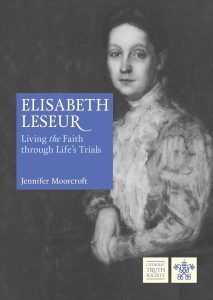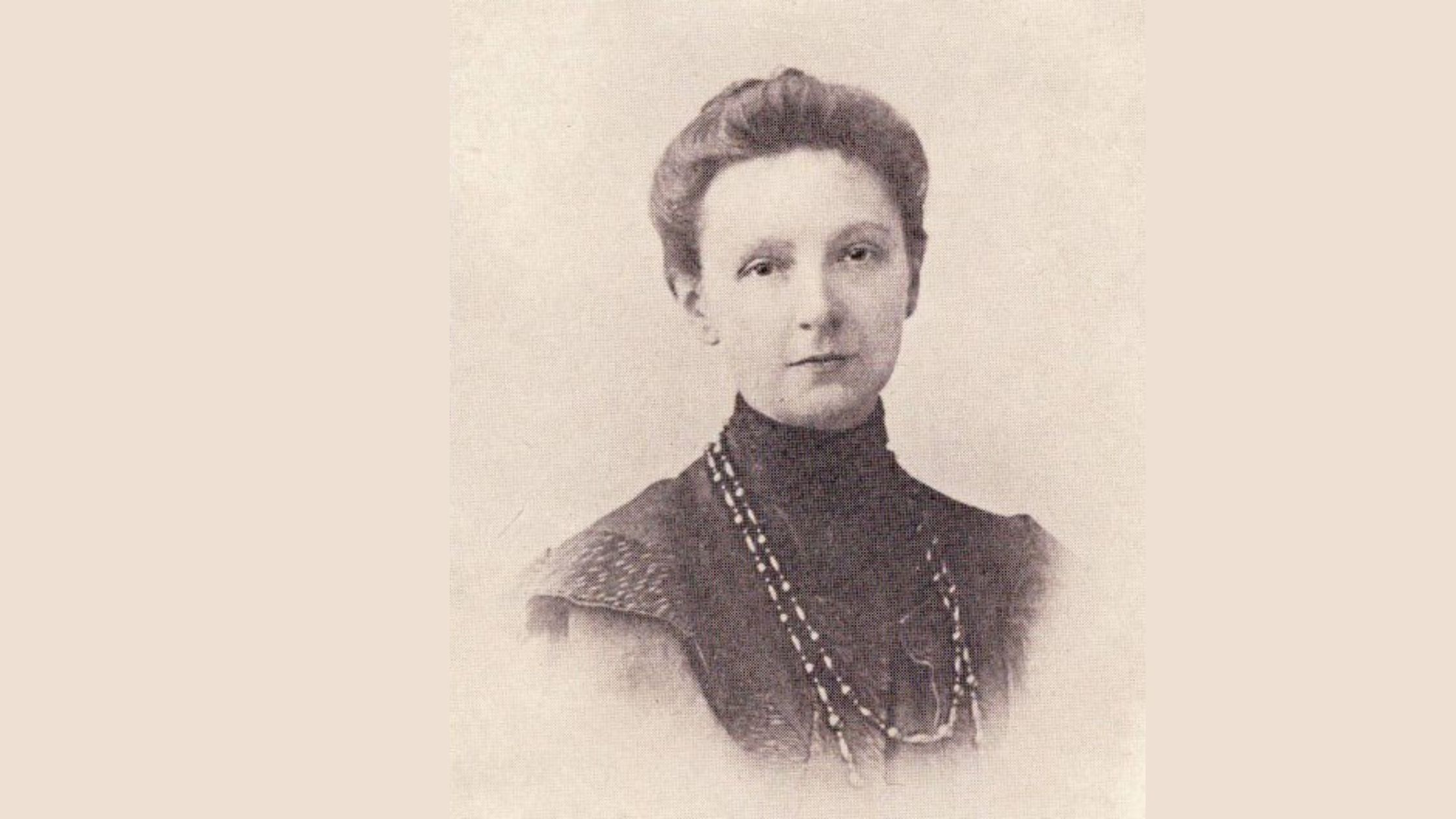Elisabeth Leseur led a life marked by challenges, including her husband’s loss of faith. After her untimely death, her husband’s discovery of her hidden spiritual writings led to his conversion. Here are some key facts to help you get to know this inspiring Servant of God, whose example can particularly inspire all those whose friends or family are not Catholic.
1. She was a strong-willed child with a ‘spirit of contradiction’.
Elisabeth was born in Paris in 1866, the eldest daughter in a wealthy family. She was a lively, strong-willed and intelligent girl who was only too aware of her faults, her ‘spirit of contradiction’, her unwillingness to admit when she was in the wrong and her tendency to being a tease; her brother Pierre was mostly the butt of her teasing and also of their quarrels.
2. She met her husband Félix at a soirée.
One evening, Elisabeth attended a soirée. Also, there was Félix Leseur, a young student doctor. The chemistry between the two was so immediate, so electric, that the whole room felt it. Elisabeth had just turned twenty-one and Félix was five years older. They found they had much in common, in their love for the arts and in travel. Their later engagement came to the delight of both their families, and they were married on 31st July 1889.
3. She was unable to have children.
Soon after the couple returned from their honeymoon, Elisabeth developed an abdominal abscess, which could lead to peritonitis, usually fatal at that time. She was bedridden for several months, and because of her internal problems the young couple were given the devastating news that Elisabeth would never be able to have children. This was an abiding sorrow for them both; Elisabeth came to terms with the loss in her own special way by lavishing her love on the children in her extended family and on the children she would meet in her work.
4. Her husband was an atheist.
Félix had confided in Elisabeth shortly before their marriage that he no longer believed in the Catholic faith. During his medical studies his faith had been undermined and then destroyed by the materialistic milieu of the university and the prevailing anti-clerical and anti-Catholic atmosphere by which he was surrounded. This had distressed Elisabeth greatly, but she had consented to their marriage on the assurance that he wouldn’t hinder her practice of her faith.
5. Her husband tried to destroy her faith.
Unfortunately, Félix went back on his promise to not hinder Elisabeth’s faith. Elisabeth became the object of his proselytising, but he found there was an easier way to detach his wife from her Christian roots. They both loved socialising, going to the theatre, art galleries and restaurants, enjoying the social round of their class. Unbelief and anti-clericalism were almost a given among many of those who came to their home. Elisabeth had almost no time to cultivate that inner silence in which she could pray and revive herself spiritually. It was with satisfaction, then, that from 1891, little by little, Félix noted that Elisabeth began losing the practice of prayer that had been so much a part of her from her childhood. As he wrote later: ‘The war that I waged against Elisabeth’s beliefs found very favourable ground in this chaos.’
6. Elisabeth found her faith again after reading two books hostile to Christianity.
Félix gave Elisabeth two books that he felt sure would destroy the last remnants of her faith. The Origins of Christianity would give her a revulsion of Christianity when she read its history, and the Life of Jesus, which was already causing great upset in Catholic circles, would expose the shaky credentials of the Gospels. Many were losing their faith, so Félix was confident that the same would happen to his wife. However, unsatisfied with the arguments made in these books, Elisabeth turned to the New Testament, at first to counter the arguments made, then to be overwhelmed by the beauty and truth of the Gospels. She rediscovered the person of Jesus Christ and would never again abandon him.
7. Her husband’s attacks on her faith helped her to find solitude with Christ.
When Félix realised that his plan had failed, he was furious, especially when he had thought victory had been assured. He therefore redoubled his criticism, his scorn, his assaults on the Catholic Faith and the Church. Elisabeth had to make something positive out of the loneliness and isolation within her soul; she accepted this loneliness and made of it a deep well in which she could plunge and find the presence of Christ, especially when surrounded by mockery and sarcasm.
8. She learned how to share her faith through witness alone.
Elisabeth knew that to be a Christian meant that she had to share her faith, but how? Within her social circle there was almost complete indifference to religion; any attempt to speak about it would be met with mockery, sarcasm and contempt for believing such childish and outmoded things. Since any direct talk of Christianity would be pointless all she could give them was the witness of her life. By cultivating all that was best within her, using her God-given gifts, she could show to others the joy, the peace, the beauty of the Christian faith. To do this she had to make time for prayer, reflection and reading to deepen her faith. Above all, the Scriptures became her daily reading and an unfailing source of light and strength.
9. She kept a secret spiritual diary.
A year after her conversion she decided to keep a spiritual diary which she started on 11th September 1889. As she began, she wrote:
“We must create in ourselves a ‘new spirit’, the spirit of intelligence and strength; we must renew ourselves and live our interior life with intensity. We must pray and act. Every day of our life must carry us nearer to the supreme Good and Intelligence – that is, nearer to God.”
10. She devoted herself to the poor.
When Elisabeth was a child, she would save up her pocket money to help the poor, and that concern for the poor was vital in her understanding of being a Christian. Her union with God had to result in an outpouring of love to others, whoever they were and whatever their circumstances. She committed herself to two organisations which were totally in accord with her aspirations, set up by women of exceptional charity and based on Catholic social teaching. The most important aim of these organisations as they offered people the help they needed, was to bring them back to God, and in this they had amazing success. Hundreds of children and adults were baptised, marriages performed or regularised, people brought back to the Faith.
11. She died of cancer aged 47.
Elisabeth discovered a small tumour on her breast, which turned out to be cancerous. On Palm Sunday 1911 she entered a small hospital which had been a Carmelite monastery, from which the monks had been expelled, where she had an operation. Although the operation was a success for a time, gradually her health began to decline. She also suffered from liver disease, but while she suffered, her husband marvelled at her almost unfailing patience and serenity; he could see that such joy in the midst of such suffering came from her faith, and he found his opposition to it softening a little. Finally, at 10 o’clock in the morning, Sunday 3rd May 1914, in the arms of her husband, she gently gave up her soul to the God whom she had loved so passionately here on earth.
12. Félix was converted by her spiritual diary and became a priest.
Going through her belongings later, Félix came across her ‘secret diary’ and other notebooks in which she had written of her love for her husband, the prayers and sacrifices she had offered up for him, her inner life of prayer. He began to understand the depth of the faith that had been so vital to her. Gradually, he found his resistance to that faith weakening; he sought out a Dominican priest who had been Elisabeth’s confessor, who reconciled him to the Church. Much against his family’s wishes, he was ordained a Dominican priest on 8th July 1923.
Learn More About Elisabeth’s Life and Read Her Inspirational Diary
 The life of French Servant of God Elisabeth Leseur was marked by adversity and moments of sorrow. Her husband, Felix, had not only lost his faith but actively sought to destroy hers. Despite these challenges, Elisabeth steadfastly maintained her love for her husband and prayed ardently for him.
The life of French Servant of God Elisabeth Leseur was marked by adversity and moments of sorrow. Her husband, Felix, had not only lost his faith but actively sought to destroy hers. Despite these challenges, Elisabeth steadfastly maintained her love for her husband and prayed ardently for him.
Unbeknownst to her husband, Elisabeth secretly documented her spiritual insights within her journals and letters. After her life was tragically cut short by cancer, he discovered and lovingly catalogued the treasure trove of wisdom she had left behind. Influenced by the profound content of her writings, Felix converted and became a priest.
This book not only presents reflections on carefully chosen passages from Elisabeth’s letters and journals, but also delves into the extraordinary example of patient and profound love she exhibited throughout life’s tribulations. Through these pages, readers have the opportunity to draw inspiration from Elisabeth’s life and, much like Felix, undergo a personal journey of transformation and conversion.
Click here to order your copy of Elisabeth Leseur: Living the Faith through Life’s Trials
